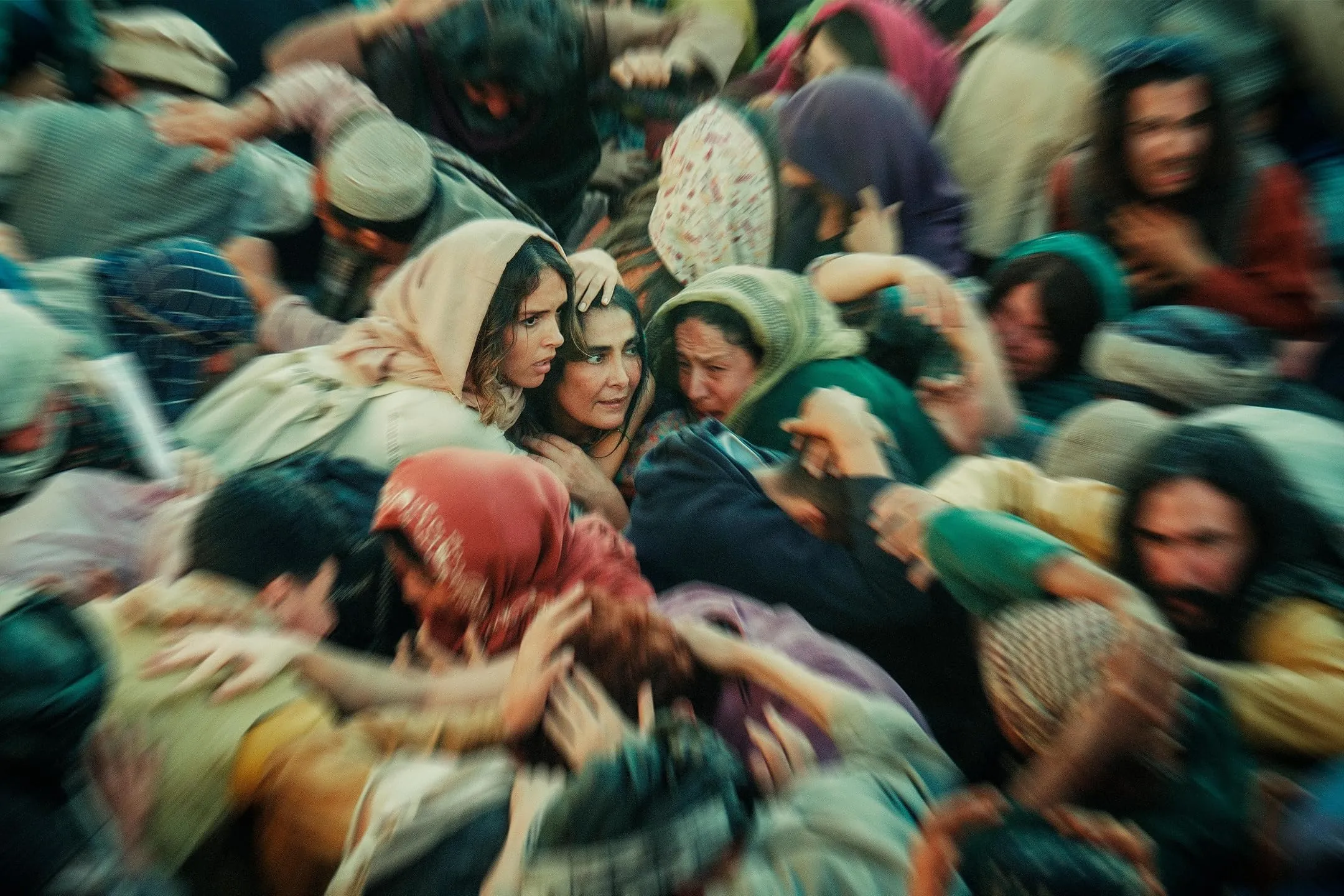The air in the opening frames of 13 Days 13 Nights is thick with dust and desperation, choked with the sound of distant gunfire and the rising panic of a populace realizing it has been abandoned. It is August 2021 in Kabul, and the city is a portrait of collapse. Director Martin Bourboulon wastes no time on preamble, dropping us directly into the frantic energy of a nation on the verge of disappearing.
This is not a distant historical account; it is a thriller with the chilling immediacy of a news bulletin, where the abstract language of geopolitics becomes the terrifying reality of a locked gate and a ticking clock. At the center of this storm is the French embassy, a suddenly fragile island of sovereignty and the last Western outpost still operating.
Inside is Mohamed ‘Mo’ Bida, a police commander just weeks from a quiet retirement that has now become an impossibly distant fantasy. He is a man facing the ultimate test not of force, but of conscience.
As the established order evaporates outside the embassy walls, Mo must contend with an impossible situation where every choice carries the weight of life and death, and the official rulebook has become meaningless paper. The film brilliantly establishes this pressure, framing the grand-scale disaster through the eyes of one man who must decide the fate of hundreds.
The Man in the Eye of the Storm
At the film’s center is Roschdy Zem’s lived-in, profoundly human performance as Mo Bida. This is not the typical action hero we’ve been conditioned to expect, all bulging muscles and stoic one-liners. Mo is weary, his face a map of his long career, but his eyes burn with a principled fire.
Zem embodies this with a remarkable subtlety; so much of his performance is in his posture, the way he carries the weight of his responsibility in his shoulders, the quiet intensity that flickers across his face. He gives the character a deep sense of credibility that anchors the entire picture in a believable reality.
In a genre that so often defaults to firepower, Mo’s primary weapons are negotiation, empathy, and a finely tuned moral compass that frequently puts him at odds with his superiors. He engages directly with the Taliban, not with a rifle raised, but with the posture of a man seeking a solution, however fraught.
This approach creates a specific kind of suspense, one born from dialogue, psychological tension, and the constant threat of a conversation turning violent. His core struggle is not with an external enemy alone, but with the French bureaucracy demanding he abandon the very people who trusted him.
The film returns again and again to this clash between the cold logic of state policy and the messy, urgent demands of human decency. This internal conflict is where the film finds its potent drama.
A Race Against Time and Convention
13 Days 13 Nights is built like a high-tension machine, meticulously engineered for suspense. Director Martin Bourboulon, working with editor Stan Collet, structures the film as a two-act sprint. The first half is a claustrophobic siege film, with the embassy becoming a sweltering pressure cooker of fear and dwindling resources.
The camera, handled by cinematographer Nicolas Bolduc, often employs intimate, handheld shots that place us directly in the scrum of bodies and desperate faces. The second half explodes outward, transforming into a perilous road movie as a convoy attempts the treacherous journey to the airport. This structural shift is effective, but the relentless velocity is a double-edged sword.
The film’s title promises a fortnight of grueling uncertainty, but the rapid-fire editing often compresses that ordeal into what feels like a few frantic days. This choice certainly maintains a high level of suspense, but it risks sacrificing the sense of prolonged physical and mental exhaustion that defines a true siege.
The narrative uses familiar elements of the genre—a tense standoff in a sodium-lit underpass, a journalist smuggled in to document events—as reliable beats. These moments work, placing the film firmly within a mainstream thriller framework rather than attempting to subvert it.
The auditory landscape reinforces this, with Guillaume Roussel’s full orchestral score acting as a constant companion. It effectively swells and recedes to amplify every moment of jeopardy, though at times it feels like a heavy hand, telling us exactly what to feel instead of allowing the quiet horror of the situation to speak for itself.
A Broader View from a French Lens
The film’s perspective is distinctly its own, a quality that elevates it beyond a simple genre exercise. While Mo is the anchor, he is supported by vital characters like Eva (Lyna Khoudri), the determined young interpreter, and Kate (Sidse Babett Knudsen), the steely Danish journalist.
They are not merely plot devices; they are essential human elements who provide different windows into the crisis and challenge Mo in crucial ways. But the most interesting aspect is the movie’s unabashedly French viewpoint on this global event. It is a cinematic retelling of France’s role in the Kabul evacuation, functioning as a form of national narrative-building. It is a story about French responsibility and, at times, French heroism.
In an era where war films often function as insulated national myths, this movie does something quietly remarkable. There is a scene where Mo’s convoy is stalled, and he pauses to look upon a row of coffins draped in American flags.
He holds his gaze in a moment of silent, unadorned respect. I cannot recall the last time I saw such an open gesture of acknowledgment for an ally’s sacrifice in a film of this type. It’s a small moment, but it speaks volumes, suggesting a view of international conflict that is not entirely self-contained.
It is a powerful piece of cinematic diplomacy that feels both surprising and deeply moving. The film succeeds as a character drama that effectively uses the tools of an action thriller to tell a specific, national story of heroism under fire.
13 Days, 13 Nights premiered May 23, 2025, at Cannes Out of Competition and opened theatrically in France on June 27, 2025, with Spain following July 25, 2025.
Full Credits
Director: Martin Bourboulon
Writers: Martin Bourboulon, Alexandre Smia, Mohamed Bida, Trân‑Minh Nam
Producers and Executive Producers: Dimitri Rassam, Ardavan Safaee
Cast: Roschdy Zem, Lyna Khoudri, Sidse Babett Knudsen, Christophe Montenez, Sina Parvaneh, Yan Tual, Fatima Adoum, Sayed Ahmad Hashimi, Benjamin Hicquel, Jean‑Claude Muaka, Luigi Kröner, Nicolas Bridet, Azizullah Hamrah, Brahim Bihi, Grégoire Leprince‑Ringuet, Johnny Amaro, Nadir Legrand, Olivier Balazuc, Avant Strangel
Director of Photography (Cinematographer): Nicolas Bolduc
Editors: Stan Collet
Composer: Guillaume Roussel
The Review
13 Days 13 Nights
Anchored by a superb performance from Roschdy Zem, 13 Days 13 Nights is a gripping, high-stakes thriller. While it leans on familiar genre conventions and a pace that sometimes undercuts its own premise, its compelling focus on diplomacy over force and its distinctly French perspective make it a powerful and worthwhile watch. The film succeeds not by reinventing the genre, but by infusing it with a potent dose of humanity and a surprising, welcome sense of global conscience.
PROS
- A stellar, nuanced lead performance by Roschdy Zem.
- Tense, well-crafted direction that creates constant suspense.
- A refreshing focus on diplomacy and moral courage over simple action.
- The unique French perspective provides a fresh lens on a recent historical event.
CONS
- An overly rapid pace sometimes diminishes the grueling 13-day timeline.
- Relies on familiar thriller conventions without much innovation.
- The orchestral score can feel manipulative and heavy-handed at times.

















































